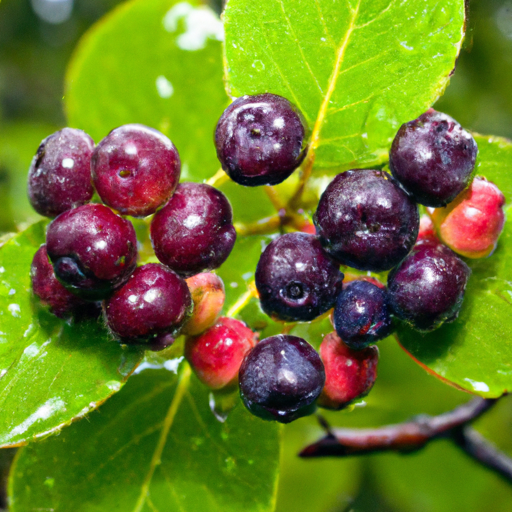Aronia: The Super Berry You Need to Know
If you’re seeking a little-known ingredient that packs a powerful punch, look no further than aronia. This unassuming berry, also known as the chokeberry, is gaining popularity among health enthusiasts and foodies alike. With its unique flavor, versatility in cooking, and remarkable nutritional benefits, aronia deserves a spot in your kitchen. Join me on a culinary journey as we explore the taste, cooking uses, nutritional value, and fascinating facts surrounding this extraordinary berry.
Taste and Culinary Uses
At first glance, aronia may resemble its distant relative, the blueberry, but its flavor profile sets it apart. These petite berries possess a distinctive combination of tartness and sweetness, making them a delightful addition to both sweet and savory dishes. When cooked, aronia develops a deep, rich flavor that resembles blackberries or currants, with a subtle hint of apple and cherry. This unique taste makes it an ideal ingredient in a multitude of culinary creations.
Aronia’s culinary applications are limited only by your imagination. Whether you’re baking, cooking, or juicing, these berries are incredibly versatile. Here are a few ideas to get you started:
- Baked Goods: Add aronia to muffins, cakes, pies, or bread for a vibrant burst of flavor and eye-catching color.
- Sauces and Jams: Harness aronia’s natural pectin content to create luscious jams, tangy sauces, or fruit compotes.
- Smoothies: Blend aronia into your favorite smoothie recipe for an antioxidant-rich twist.
- Salads: Toss a handful of fresh or dried aronia into salads to provide a delicious contrast and visual appeal.
- Meat Pairings: Aronia’s tangy profile pairs exceptionally well with meats, particularly when used in glazes or reductions.
Nutritional Benefits
Beyond its delicious taste, aronia boasts an impressive array of health benefits. These berries are naturally abundant in antioxidants, particularly anthocyanins, which give them their deep purple hue. Antioxidants help neutralize harmful free radicals in the body, promoting overall health and well-being. Additionally, aronia is an excellent source of vitamins C and E, dietary fiber, and minerals such as potassium and manganese.
Research suggests that aronia may contribute to several health benefits, including:
- Heart Health: The antioxidants in aronia may support cardiovascular health by reducing inflammation and LDL cholesterol levels.
- Immune Support: Vitamin C in aronia helps strengthen the immune system, particularly during colder months.
- Digestive Wellness: The fiber content of aronia promotes healthy digestion and may improve gut health.
- Weight Management: Aronia’s low calorie and high fiber content make it a satisfying snack that can aid in weight management.
Fascinating Facts about Aronia
Exploring the unique qualities and origins of aronia adds an exciting twist to our culinary journey. Here are some interesting facts you may not know:
- Aronia berries were traditionally used by Native American tribes for their medicinal properties long before their culinary potential was discovered.
- Aronia berries contain one of the highest antioxidant levels among all fruits, making them an excellent addition to a balanced diet.
- Poland, Russia, and the United States are the largest commercial producers of aronia berries.
- Due to their tartness, aronia berries are rarely eaten raw and are instead typically used in cooked or processed forms.
- Aronia bushes are hardy and adaptable, thriving in various climates and soil conditions, making them an ideal berry to grow in your own backyard.
In Conclusion
Aronia, with its unique taste, culinary versatility, and impressive health benefits, is undoubtedly a remarkable ingredient worth exploring. From baked goods and sauces to smoothies and salads, this super berry adds new dimensions of flavor and visual flair to your culinary creations. Not only does aronia enhance the taste of your dishes, but its high antioxidant levels also contribute to improved overall health.
So, why not embark on your own aronia adventure? Incorporate this little-known berry into your cooking repertoire and unlock a world of delicious possibilities. Your taste buds and body will thank you!
Check out this recipe to get started with aronia in your cooking journey. Happy cooking!
Note: It is essential to consult with a healthcare professional before making significant changes to your diet or lifestyle.
Aronia
Origin: Aronia, also known as chokeberry, is native to North America. There are two main species of aronia: Aronia melanocarpa (black aronia) and Aronia arbutifolia (red aronia). Black aronia is more commonly cultivated and used.
Common Uses: Aronia berries can be used in various culinary applications. They are often used to make juice, jams, syrups, and desserts like pies and muffins. The berries can also be dried and used in trail mixes or added to granola. Some people enjoy eating them fresh, but their tart flavor may not appeal to everyone.
Nutritional Benefits: Aronia berries are highly nutritious. They are rich in antioxidants, particularly anthocyanins, which give them their deep purple color. Antioxidants help protect the body from oxidative stress and may have numerous health benefits. Aronia berries are also a good source of vitamins C and K, dietary fiber, and minerals like manganese and potassium.
Unique Properties: One of the unique properties of aronia berries is their high concentration of polyphenols, which contribute to their antioxidant activity. Additionally, aronia berries have a natural tartness, which makes them a popular ingredient for balance in recipes that require a combination of sweet and sour flavors.
Historical Significance: Aronia berries have a long history of use among Native American tribes as a food source and for their medicinal properties. In the past, they were also used as a natural dye, primarily for textiles.
Please note that while aronia berries have been studied for their potential health benefits, it’s important to consult with a healthcare professional for personalized advice and before making any significant changes to your diet.




Use the share button below if you liked it.
It makes me smile, when I see it.